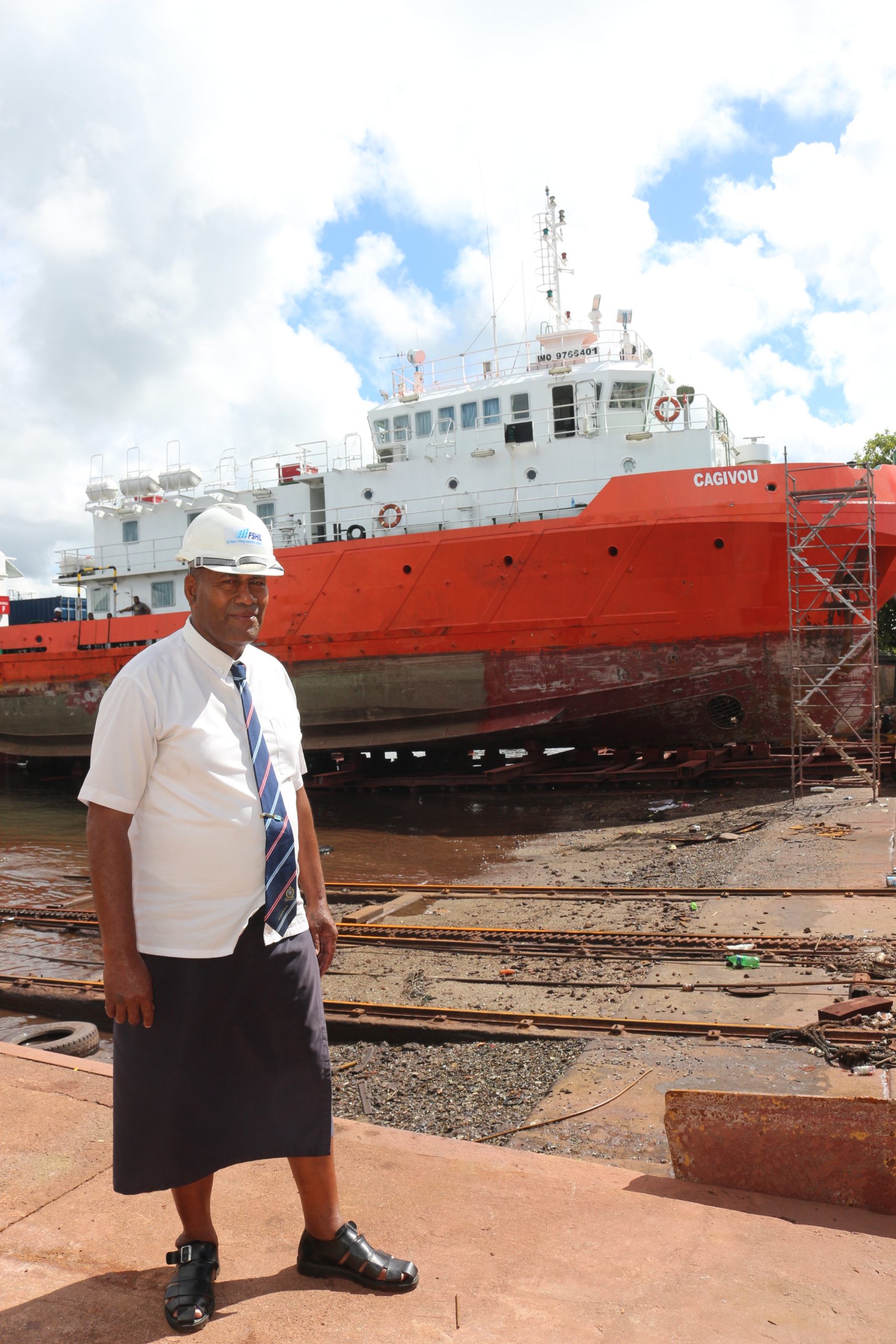
 Lopeti Radravu is the man leading Fiji mission to be the Marine Gateway in the Pacific Region. He is the Operations Manager of Fiji Ships and Heavy Industries Limited (FSHIL), a subsidiary of Fiji Ports Limited.
Lopeti Radravu is the man leading Fiji mission to be the Marine Gateway in the Pacific Region. He is the Operations Manager of Fiji Ships and Heavy Industries Limited (FSHIL), a subsidiary of Fiji Ports Limited.
Radravu grew up in Naroi Village which is one of the largest villages on Moala Island in the Lau Group. This meant that ships often came to this village to bring supplies for the people. Seeing the ships always made young Radravu wonder how it worked. He imagined himself learning the mechanics of ships.
His elder brother had the same fascination which led to him becoming a Marine Engineer. “My elder brother is a Marine Engineer in the US. Seeing him, I wanted to become a Marine Engineer too,” said Radravu.
Radravu attended Naroi District School in his village. He attained his secondary education from Lelean Memorial School in Nausori. During this time he was boarding at the school hostel.
While in Year 11, Radravu applied to work for the Fiji Marine Department (FMD). He submitted his application for three different fields; deck, marine engineering and shipwright. He was selected in the shipwright section as the other two sections were already occupied. He started work at the Fiji Marine Department in 1983.
In 1984, the Fiji Marine Department sent him to the Fiji National Training Council (FNTC), now the National Training and Productivity Centre (NTPC) to begin the Apprenticeship Program. Under this program, he had to complete Stages one to five.
The program essentially required apprentices to complete the theory aspect in the first trimester at FNTC then return to the industry for practical learning during the second trimester. In the third trimester, apprentices go back to FNTC for the theory aspect. This is repeated for five years.
“I never regret going through the apprenticeship system. We learnt the basics of the trade. Year one and year two we all go through the same training programs with similar syllabus up to stage three. Stage four then you go into your field,” said Radravu.
“Being chosen as a shipwright apprentice did not mean that I will be trained in my core units only. I had to go through the basics of electrical, fitting and machining, plumbing, woodworking and joinery and that is the beauty of the apprentice program,” he added.
Radravu graduated in 1988 after completing all the five stages of the program.
After this, Radravu was seconded to the Fiji School of Maritime Studies (FSMS), now Fiji Maritime Academy (FMA), under the College of Engineering, Science and Technology (CEST) to teach. Coming from the industry, teaching was a new field for him.
“When I went to the Maritime School I believed that I knew everything about ship building. On the first day students were not concentrating on what I was teaching, they were not grasping what I was teaching. Afterwards, I relayed the message to the HOD who told me that he will put me through to Teacher Training,” he said.
“During the semester break in 1993, I was chosen to undergo the Teacher Training program at the Fiji Institute of Technology (FIT). This is when I realized that teaching is a field on its own,” he added.
Radravu studied part-time and graduated with an International Diploma in Tertiary Teaching in 1996.
In that time he was promoted from Assistant Lecturer to a Lecturer. He also taught Stability Calculation units and Structural Engineering units in the Aircraft Engineering Department and the School of Mechanical Engineering in FIT.
“I was able to teach multiple subjects because of the training during the apprenticeship program. We were able to learn a lot of things,” he said.
In 1997, he was awarded a scholarship to study Diploma in Naval Architect at the Australian Maritime College. He left Fiji to pursue his studies in 1998 and graduated in 2000.
Upon his return to Fiji he continued teaching and was promoted to Head of the Shipbuilding Department.
He also travelled to the Kingdom of Tonga to teach in the Maritime School on various occasions.
After spending 17 years in the FSMS, he resigned and joined the Maritime Safety Authority of Fiji in 2008 as a Marine Health Surveyor.
In 2010, he went back to where it all started for him, the FMD which had been renamed to FSHIL. He was employed as the Works Manager and served at this position from 2010 to 2013.
At this stage he realized that he lacked business knowledge which was essential for the position he was serving. He then pursued further education at the University of the South Pacific. He completed a Post Graduate Certificate in Human Resource Management and a Post Graduate Diploma for General Managers and graduated with a Master in Business Administration in 2013.
After the reforms to the company, he was promoted to Operations Manager in 2013. He is currently serving at this position.
Speaking about his studies at FNTC, he says that those days formed the basis of his career. “Where I am today would not be possible if not for the apprenticeship scheme. I was able to gain the foundation knowledge to reach where I am today,” he said.
Radravu’s advice to current and future students and apprentices is to have a passion and believe in their dreams and try to achieve those dreams. “Money should not be your focus. You have to start somewhere. Keep goals. Work towards those goals. Life will present you with many opportunities, learn to take them,” said Radravu.
He added that working hard will lead students and apprentices to be great leaders in life. Radravu currently resides in Suva with his wife, seven children, son in law and grandchildren.